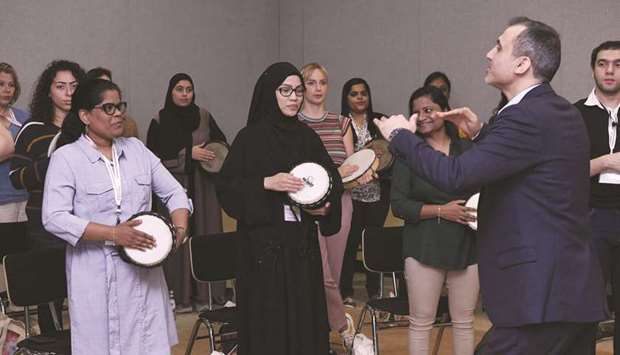A course by Weill Cornell Medicine – Qatar (WCM-Q) and Qatar Music Academy (QMA) has taught healthcare professionals how to use music therapy to treat a variety of conditions, including anxiety, depression, autism, Alzheimer’s, cerebral palsy, and stroke.
The course, composed of 10 online modules and four practical workshops and held at Qatar Music Academy, used evidence-based sources to explain how music causes physiological changes in the listener and how this effect can be used therapeutically in clinical scenarios.
The course covered topics such as music therapy for people with special needs, the history of music therapy in the Middle East and the West, how to tailor music therapy approaches to individual patients, and the theory and practice of neurologic music therapy.
The workshops were led by Dr Ghizlane Bendriss, lecturer in biology and neurosciences at WCM-Q, Rula El Barghouthi, a qanun instructor and music therapist in the music schools ‘Crescendo’ and ‘Action for Hope’ as well as Unicef programmes in Jordan, and Abdalla Mhoul, a oud and voice instructor at QMA.
In the final workshop, the group discussed breathing and singing techniques before taking part in a drum circle and analysing the activity’s physiological and cognitive effects.
Dr Bendriss said: “Research has demonstrated conclusively that music therapy approaches can be extremely effective at treating an extremely wide range of conditions, particularly neurological conditions. Despite the Mena region having a rich musical culture and also a history of using music therapy, it is not widely practised in the region today. With this certificate programme, we aim to equip local healthcare professionals with a foundation of skills and knowledge so that they can use music therapy to help their patients.”
“In the past, QMA has been able to successfully collaborate with other entities on the subject of music therapy, and we hope to be able to include music therapy as a unit in our curriculum in the future. All of us at QMA are delighted to have been able to work with WCM-Q to share the gift of music and the extraordinary power it has to not only lift our mood and inspire us but also to bring comfort and healing to people who are unwell,” said QMA director Dr Abdul Ghafour al-Heeti.
The online modules of the course provided participants with a foundation of knowledge in the anatomy of the brain and nervous system, basic music theory, music therapy for treatment of Parkinson’s disease, Alzheimer’s disease, anxiety, stress, depression and pain management, music therapy in the Middle East, medical ethics, and instructions on how to refer, assess and write reports for patients undergoing music therapy.

Participants take part in a drumming exercise at a music therapy workshop held in a collaboration between WCM-Q and QMA.
